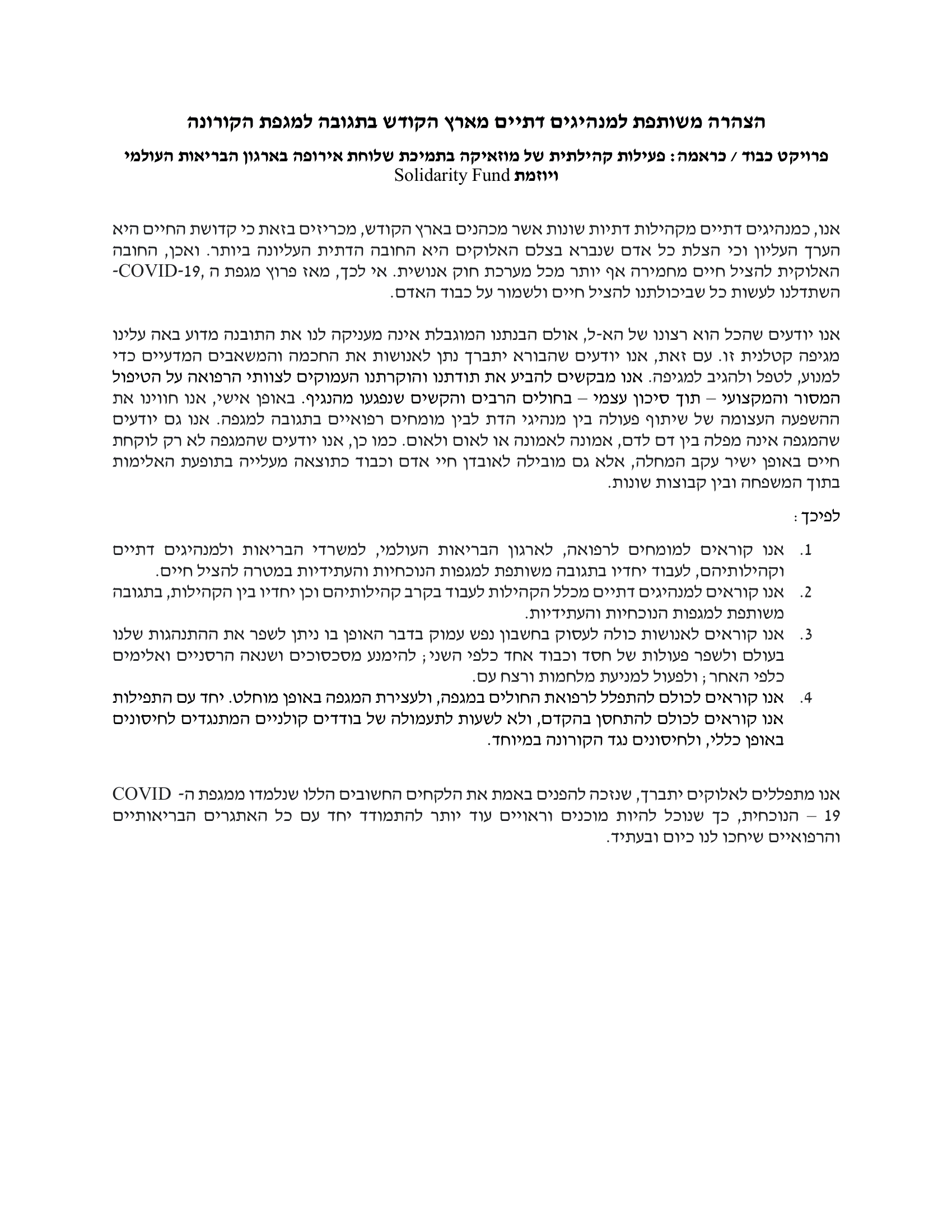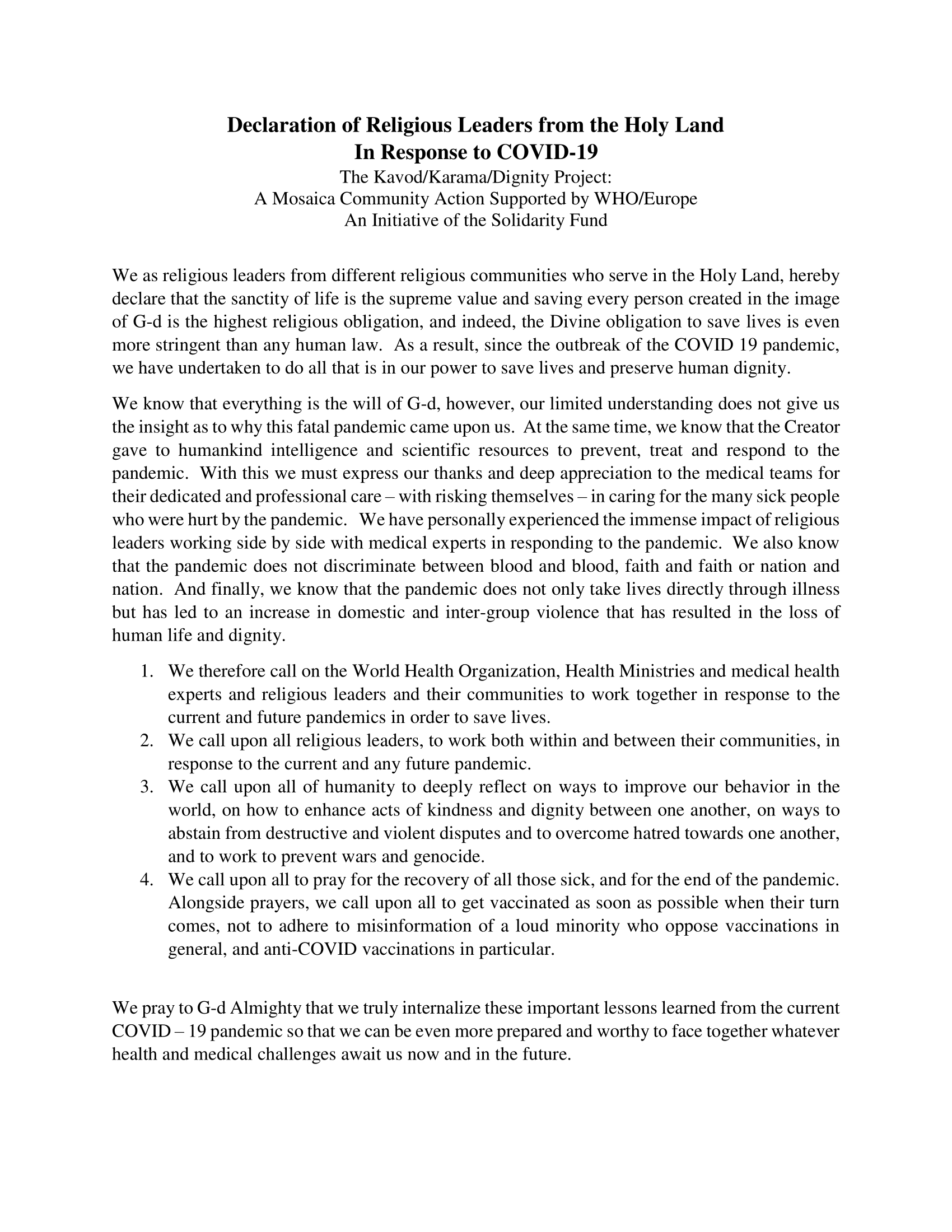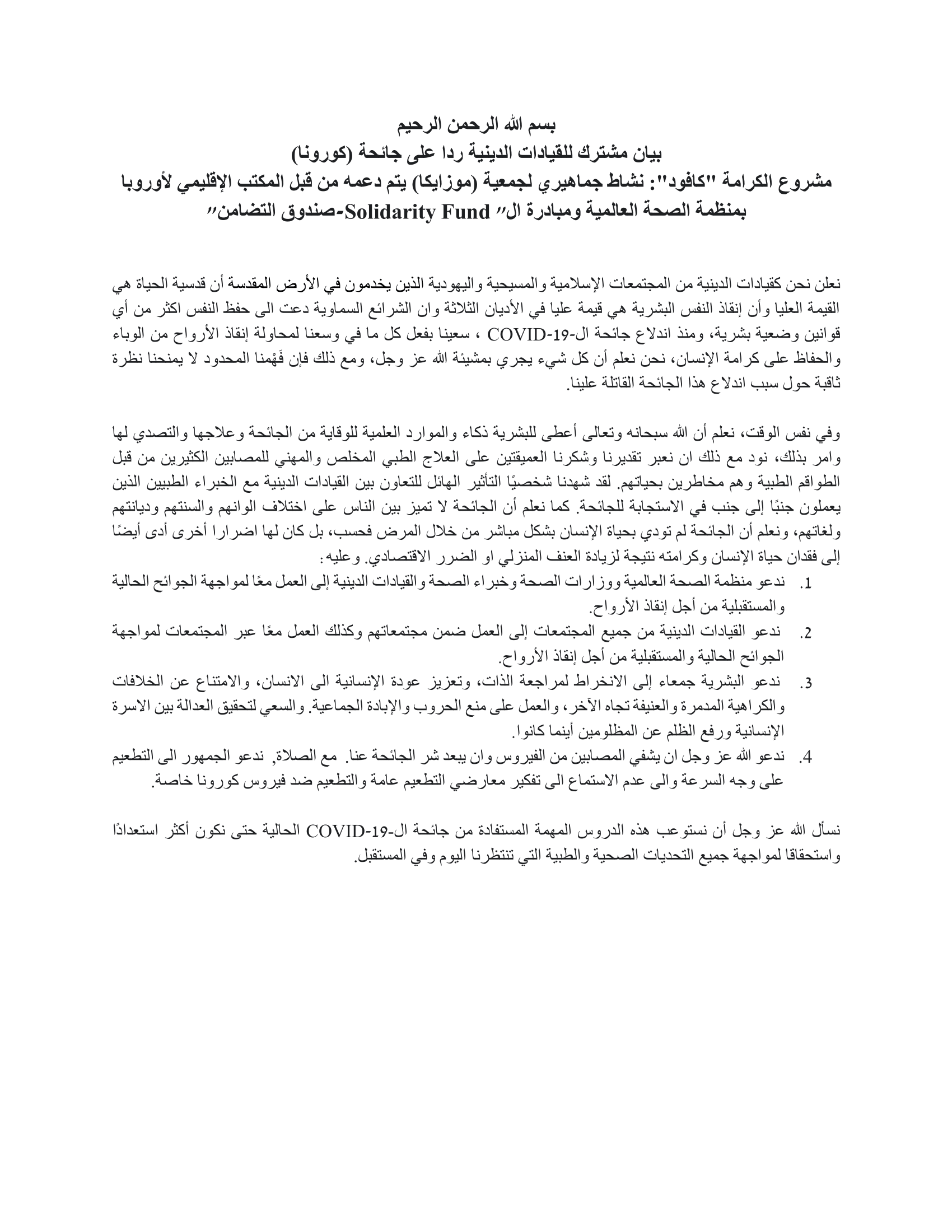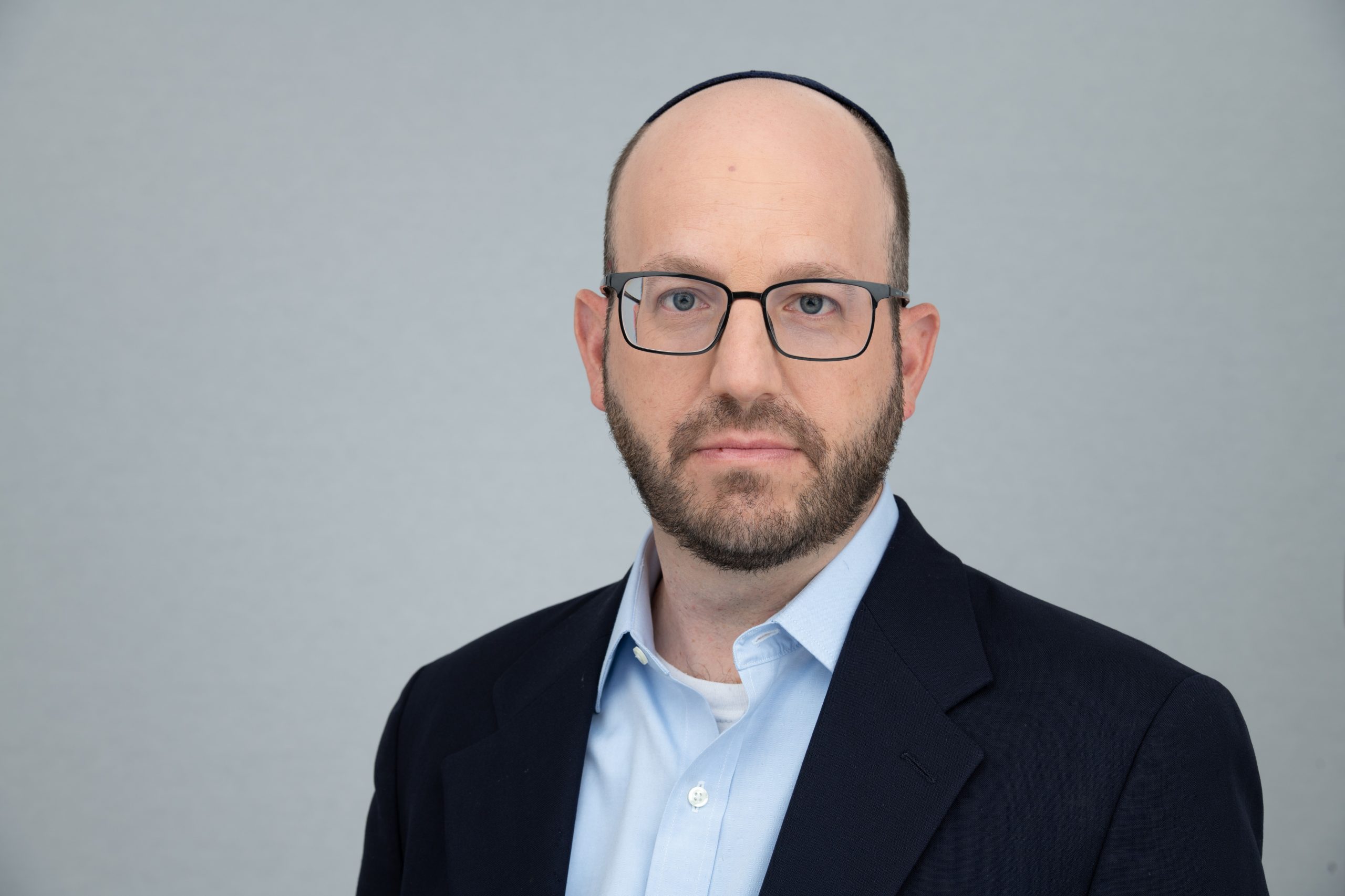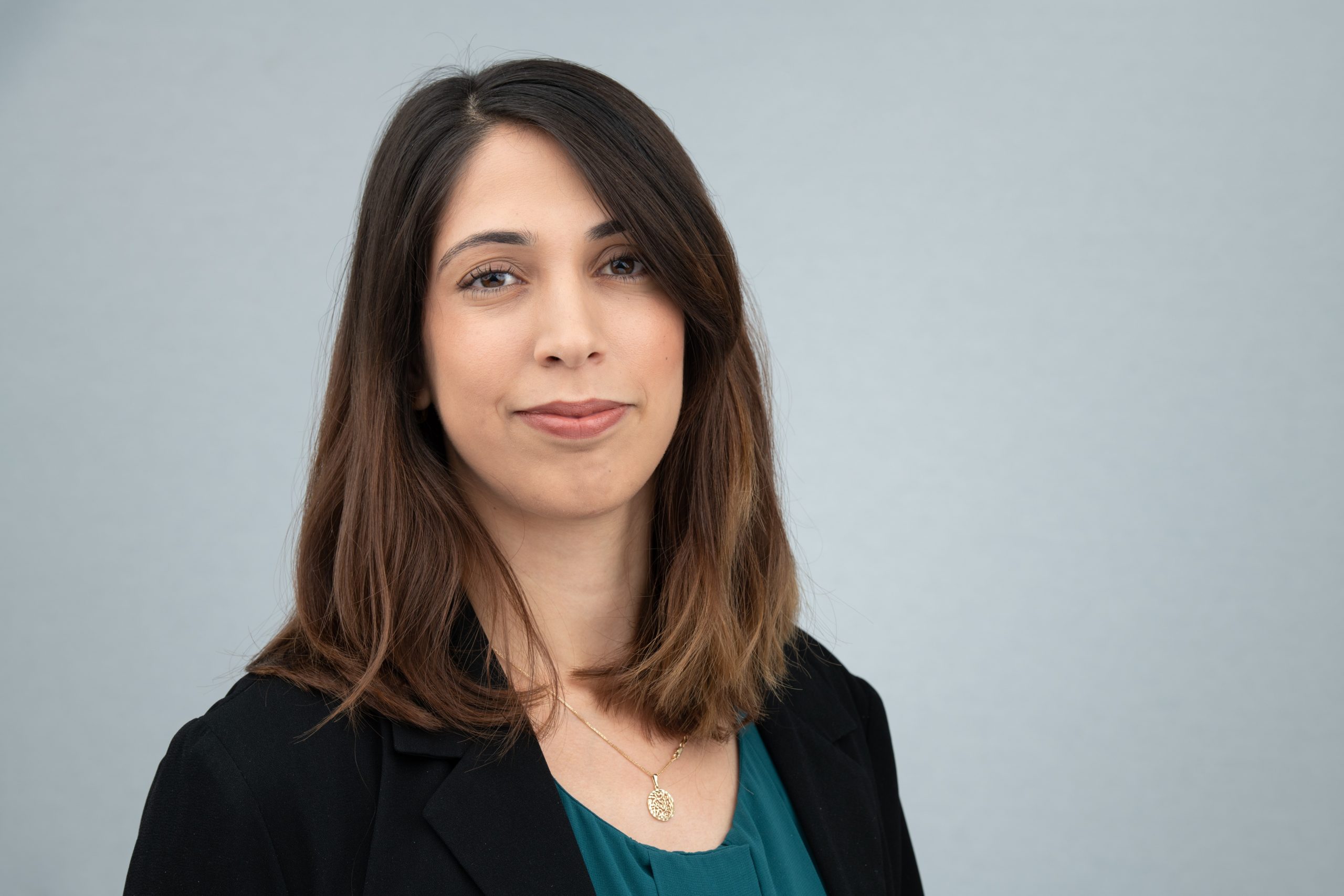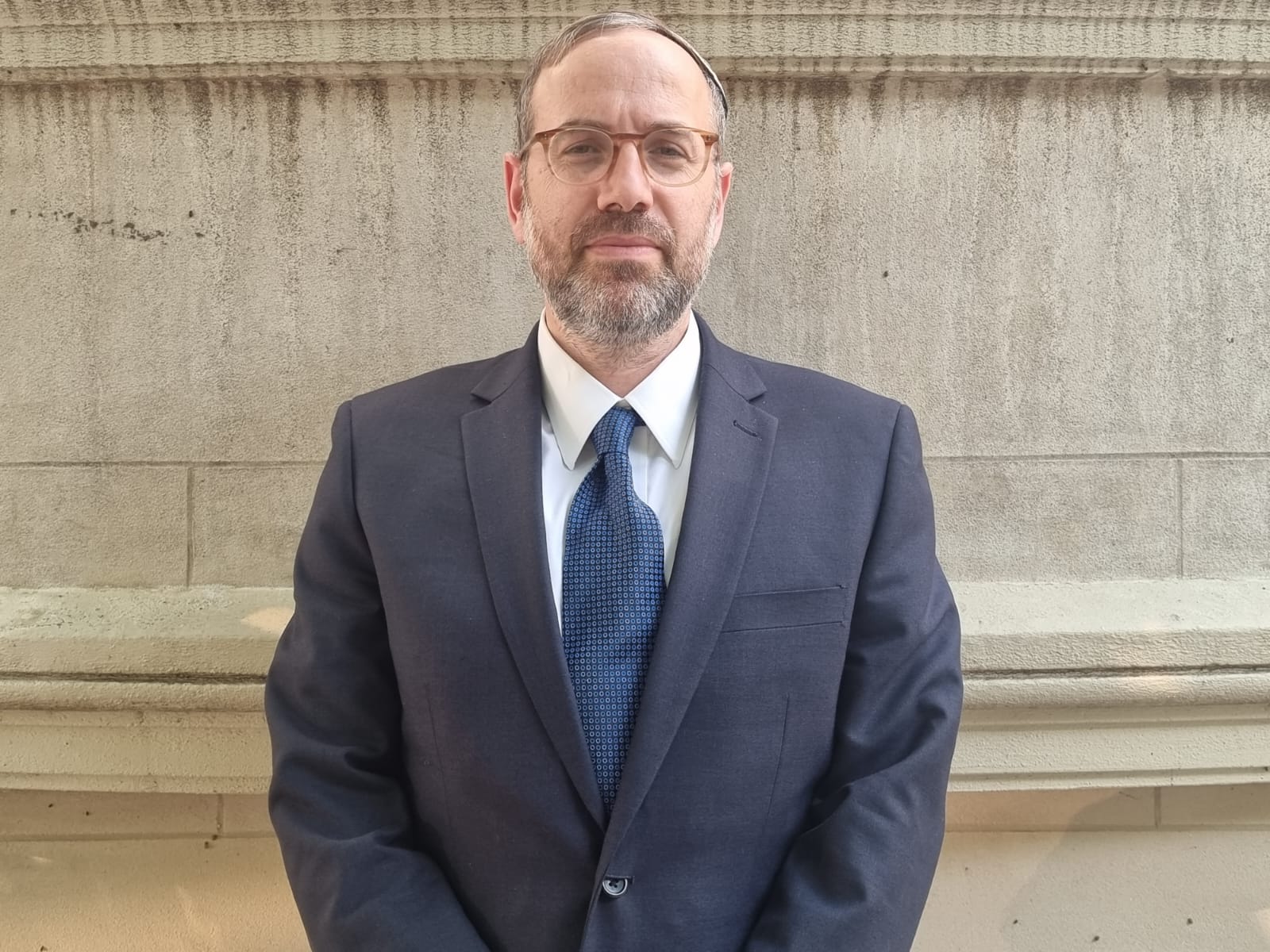Table of Contents
The Kavod-Karama (Dignity) Project: Insider Religious Mediation in the Context of COVID-19
 Project Goal
Project Goal
The overall objective of the Kavod-Karama (Dignity) Project was to strengthen and expand Mosaica’s religious and community mediators’ capacity to respond more effectively to both the current Covid-19 pandemic and future emergencies. This helped advance overall resilience and readiness of religious communities by combining scientific soundness with religious appropriateness at both the national and local levels.
 Background
Background
Since the outbreak of COVID-19, Mosaica worked to address the numerous medical, social and religious implications of the pandemic. This included opening up a mediation hotline to help provide various mediation services and work to resolve conflicts. In addition, one of Mosaica’s Senior Religious Mediators, Sheikh Ra’ed Bader responded to countless religious challenges that the pandemic raised. He was one of the first leaders to call on mosques to close and issued tens of fatwas (Islamic religious rulings) calling on Muslims to adhere to the preventative guidelines.
In September 2020, Mosaica’s Senior Insider Religious Mediators became aware of a widespread Covid-19 conspiracy that was spreading in the region that the WHO was secretly paying hospitals to inflate the number of deaths caused by the pandemic. In response, they arranged a zoom meeting between Dr. Dorit Nitzan, the Regional Emergency Director at the World Health Organization’s Regional Office for Europe, senior Islamic religious leaders and senior medical doctors within the Arab sector. Within a day, the religious leaders spoke on television and wrote articles disclaiming the conspiracy theory and reestablishing trust in the scientifically-based measures being taken to respond to Covid-19.
Following this success, in which Mosaica successfully refuted the conspiracy theory, Mosaica established the pilot project Kavod/Karama Project (meaning dignity in Hebrew and Arabic, and a play on words of Covid/Corona). In Judaism, Islam and Christianity, there is a core value of saving lives and respecting human dignity. In Hebrew, this value is called kvod habriyot (כבוד הבריות, lit. human dignity) and in Arabic, karamat al’iinsan (كرامة الإنسان). This project was therefore called Kavod/Karama for the Hebrew and Arabic word for dignity, to emphasize the religious calling to advance human dignity and well-being during this challenging time of Covid-19.
Over the course of the project, Mosaica organized a forum of senior religious leaders who discussed religious and communal challenges facing their communities due to Covid-19 and ways to address these challenges from a religious and medical perspective. The Senior Religious Forum wrote and signed the Declaration below, declaring their commitment to saving human lives and human dignity. In addition, leaders held vaccination campaigns that were suitable for their community needs and reached out to their communities through religious rulings and videos. To get a glimpse, watch the documentary below and read the academic findings of the work.
Learn More: Watch Rabbi Dr. Daniel Roth, Director of Mosaica’s Religious Peace Initiative present the project, The Role of Religious Leaders in Responding to COVID 19: A Case Study of Sheikhs and Rabbis in the Holy Land at a WHO Europe RCCE Webinar,
 Declaration
Declaration
Declaration of Religious Leaders from the Holy Land In Response to COVID-19
Over the course of the COVID-19, Mosaica gathered a forum of professionals and religious leaders inside the Holy Land. The goal of the group was to discuss best practices for the challenges religious leaders were facing within their communities and to jointly produce the following document:
 Interim Implementation Guide
Interim Implementation Guide
Over the course of COVID-19, the WHO worked to address the unique challenges that different communities faced during the pandemic. Please check out their interim implementation tool: “Engaging with religious leaders, faith-based organizations, and faith communities in the WHO European Region on COVID-19 response.”
 Research
Research
Research on the Role of Religious Leaders Responding to COVID-19
Essa-Hadad J, Abed Elhadi Shahbari N, Roth D and Gesser-Edelsburg A (2022) The impact of Muslim and Christian religious leaders responding to COVID-19 in Israel. Front. Public Health 10:1061072. doi: 10.3389/fpubh.2022.1061072
Rubinstein-Shemer N. “You Are All Soldiers in the Battle against the Corona Virus and Your Commander Is the Prophet Muḥammad”: The Fatwās of Sheikh Rāʾid Badīr Regarding COVID-19. Religions. 2023; 14(1):98. https://doi.org/10.3390/rel14010098
Academic Conference
Religious Leaders Contending with the Common Enemy of Covid-19 (Watch Here)
Senior Annual Conference on Religious Diplomacy, March 15, 2022
- Mosaica – Religion, Society and State
- Conflict Resolution, Management & Negotiation Graduate Program, Interdisciplinary Studies Unit, Bar-Ilan University
- Berkely Center for Religion, Peace & World Affairs, Georgetown University
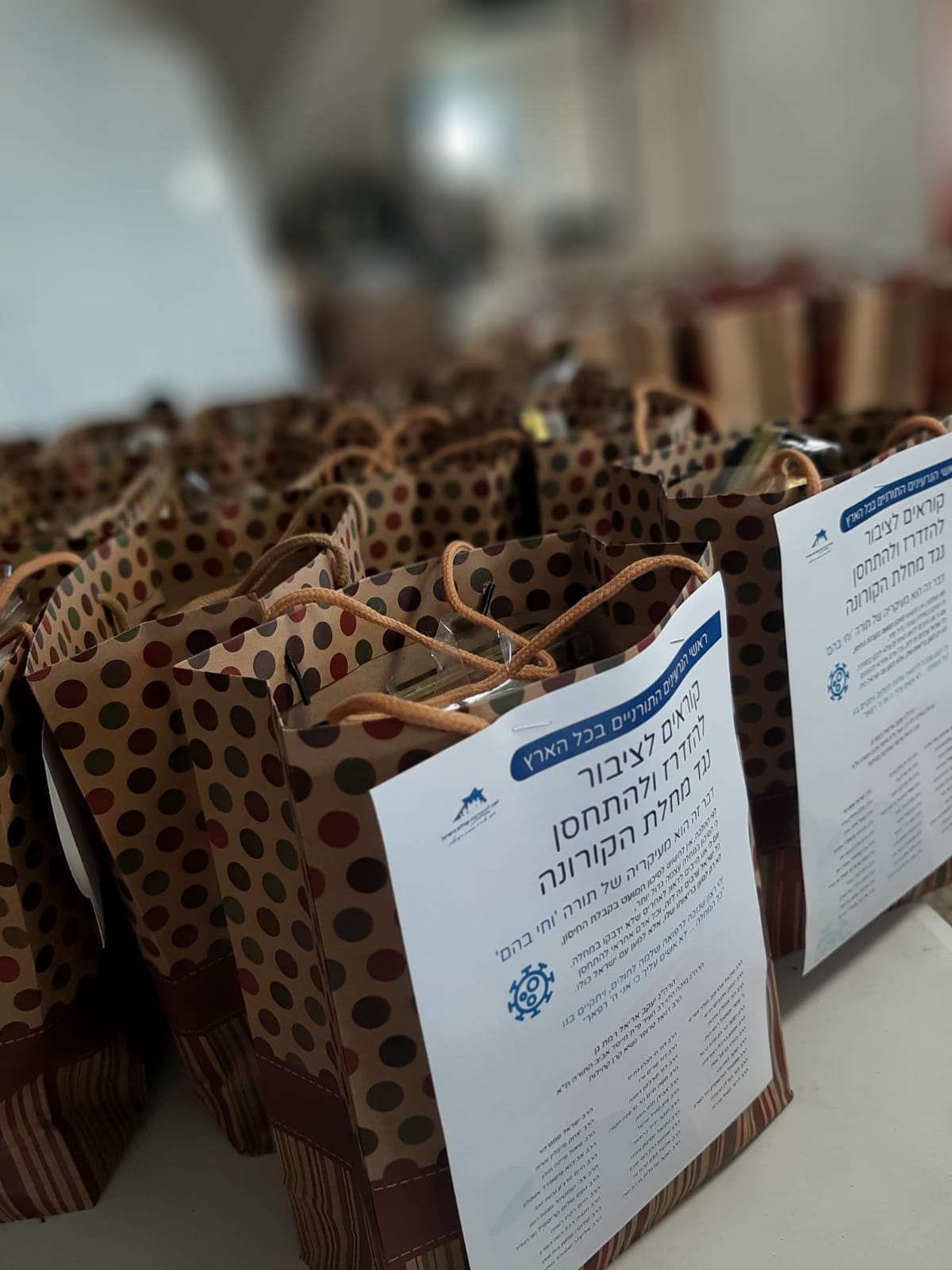
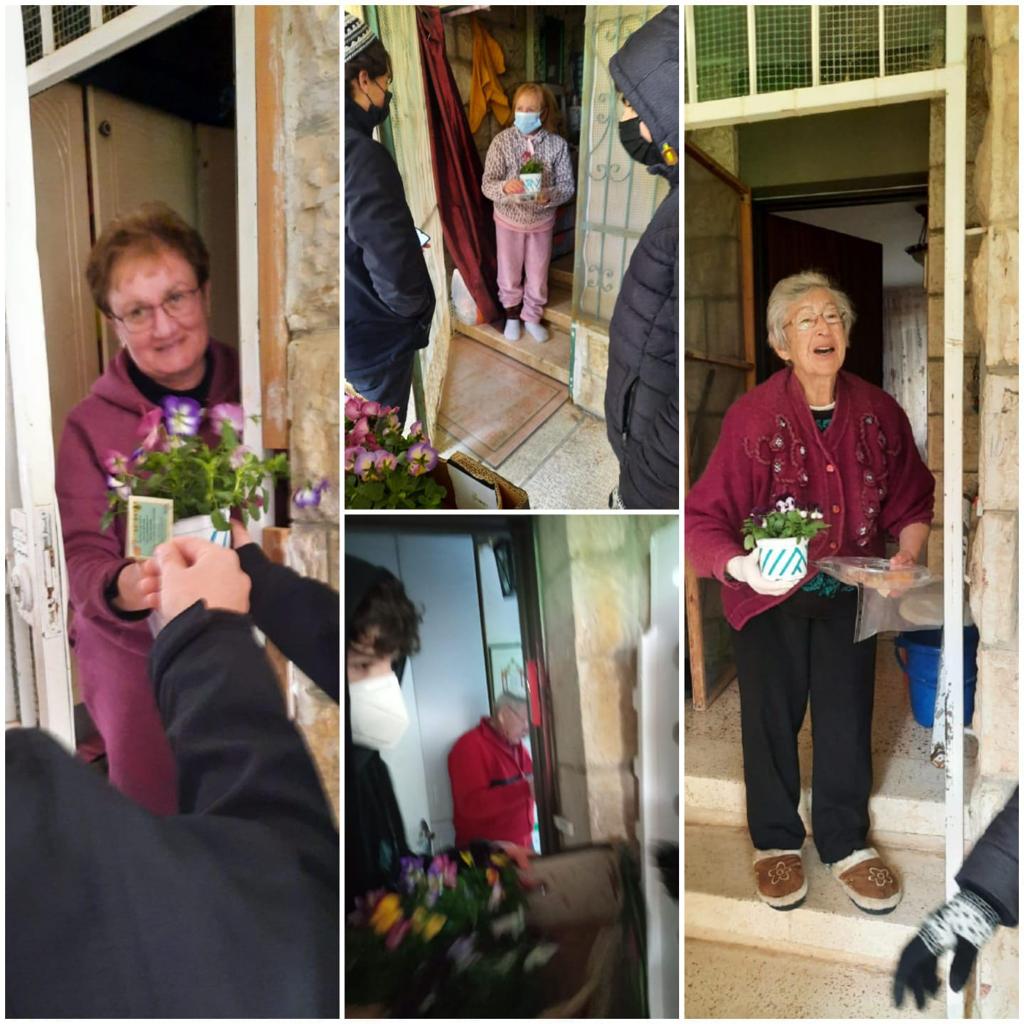
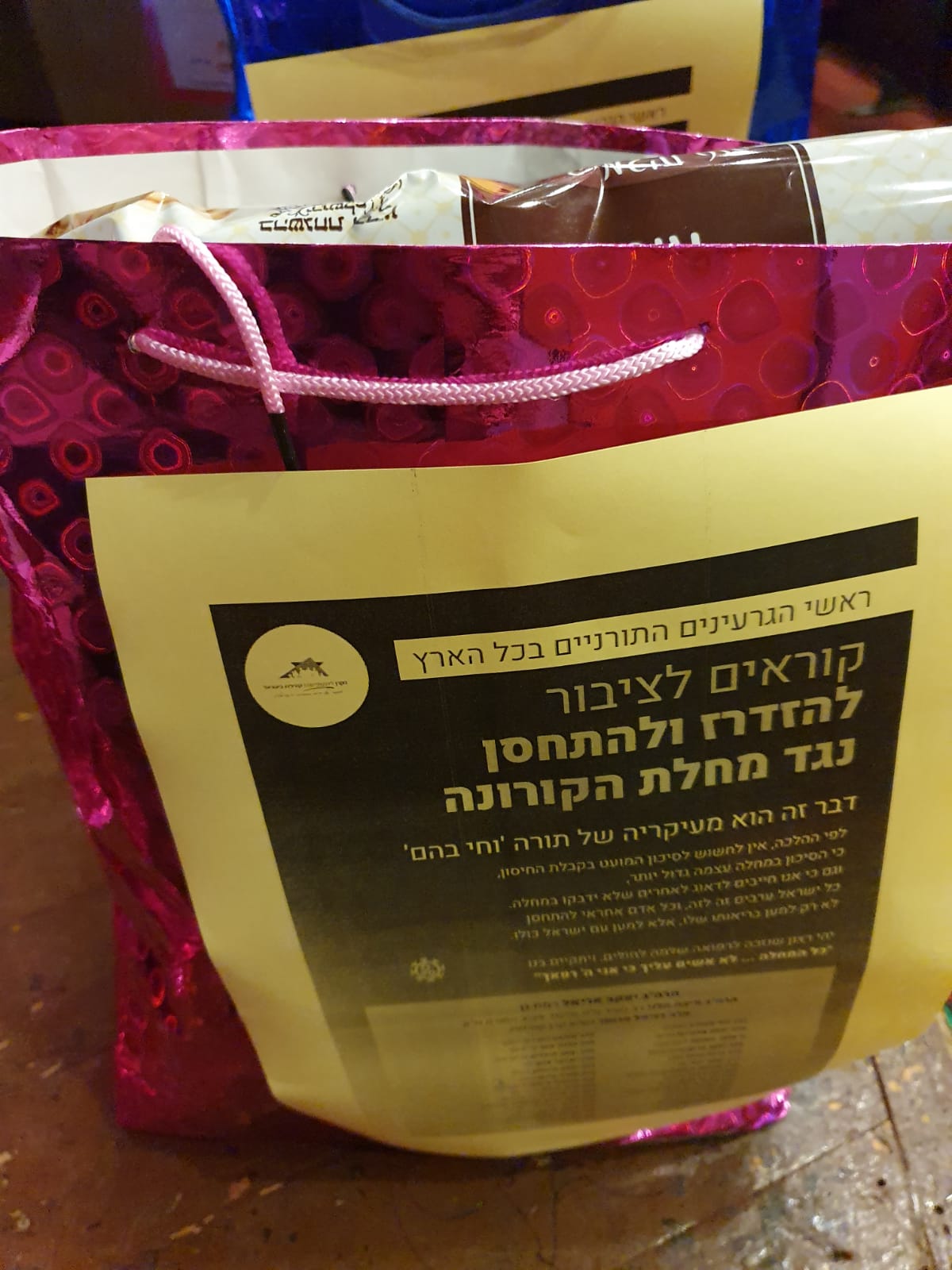
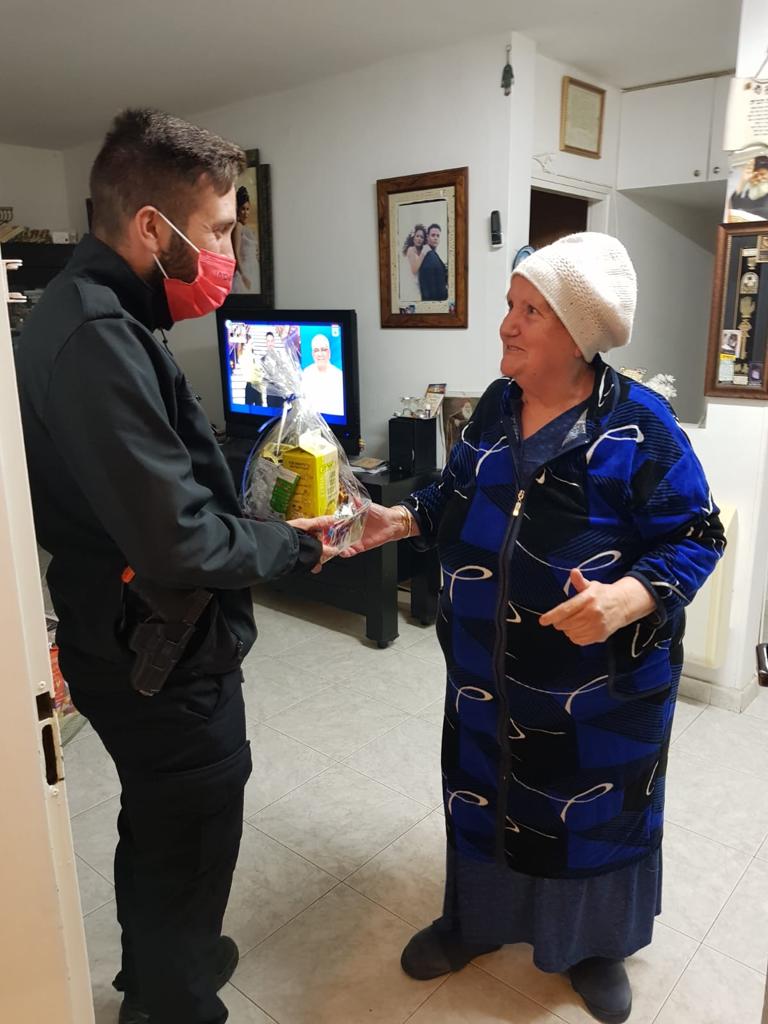
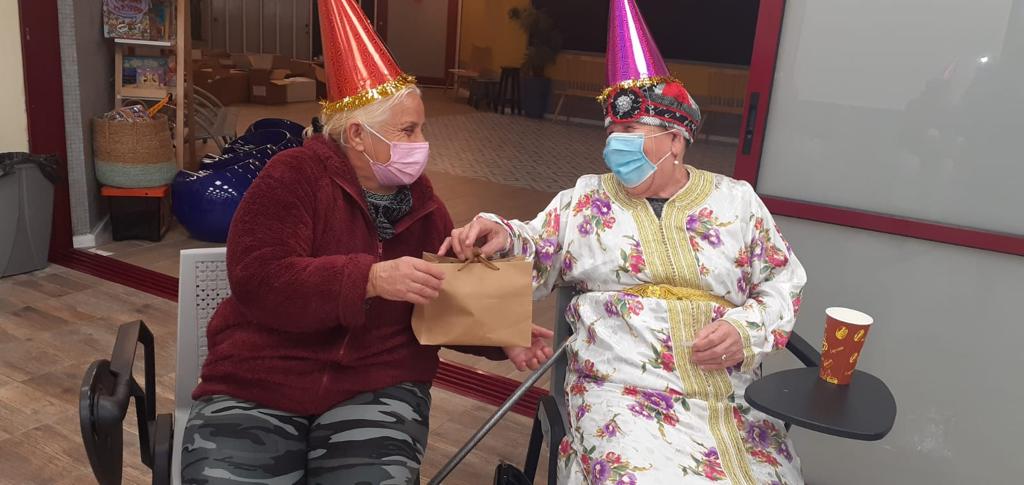
 Staff
Staff
Rabbi Dr. Daniel Roth is the director of Mosaica, an Israeli NGO advancing community mediation and dialogue in Israel. Much of Roth’s work focuses on the network of insider religious mediators who help prevent, mitigate, and mediate crisis situations throughout Israel, the Middle East, and beyond. Roth also works to connect religious leaders to the roughly 90 community mediation and dialogue centers and initiatives throughout Israel, including 30 in the Arab sector and 16 in mixed Jewish-Arab cities and areas, which Mosaica professionally supports through a tender of the Ministry of Welfare and Social Affairs called the Gishurim Project.
Dr. Roth is a core faculty member at Bar-Ilan University’s Graduate Program for Conflict Management, Resolution and Negotiation and at Tel Aviv University’s International Program in Conflict Resolution and Mediation, where he teaches graduate courses on crisis management, religious conflict resolution, and peacebuilding. Roth is also a core faculty member of Shakla vaTariya, the institute for negotiation and crisis management based in Herzliya. Roth is also a regular lecturer for MEJDI Tours/National Geographic. He has published several academic articles on conflict resolution in the Jewish tradition and on insider religious mediation in the context of the Israeli-Palestinian Conflict. His book, Third-Party Peacemakers in Judaism: Text Theory and Practice, was published by Oxford University Press in 2021.
Formerly, Roth was the founder and director of the Pardes Center for Judaism and Conflict Resolution; the Mahloket Matters Projects; and the 9Adar: Jewish Week of Constructive Conflict, which continues today as Dibur Hadash: the Israeli Week of Mediation and Dialogue. Roth was a senior research fellow at George Mason University’s Center for World Religions, Diplomacy and Conflict Resolution.
Roth holds a Ph.D. from Bar-Ilan University’s Graduate Program for Conflict Management, Resolution, and Negotiation; an MA in Talmud from the Hebrew University of Jerusalem; a B.Ed in Jewish Philosophy from Herzog Teachers’ College; and studied for eight years at Yeshivat Har Etzion during which time he received Orthodox rabbinic ordination. He lives with his wife and four children in Jerusalem.
Michael Orovano earned a Bachelor’s degree in Education and Sociology/Anthropology from the Hebrew University. She is currently completing a Master’s in Conflict Resolution, Management, and Negotiation at Bar-Ilan University. She has completed courses in basic mediation, mediation practicum, family mediation, intergenerational mediation as well as conflict resolution training and group counseling training.
At Mosaica, she manages training and the development of programming about various topics connected to the network of Community Mediation and Dialogue Center throughout the country. Topics include education, activism for tolerance, and co-existence in mixed Arab-Jewish cities. She is also responsible for developing and managing specialized training for community mediators. She provides guidance to many centers that are in the process of being established, including on issues related to management, strategy building, and tools for initial activities.
One of her responsibilities is the management of Dibur Hadash: The Israeli Week of Mediation and Dialogue. Over 50 events are held across Israel during this week to promote the language of mediation and consensus building in the communities and to raise awareness among the public.
Rabbi Matanya Yadid (b. 1979) is the co-director of Mosaica’s Religious Mediation Initiative, which seeks to connect influential religious and political leaders throughout the Middle East through ‘religious mediation’ towards religious peace.
Rabbi Matanya is also the founder and director of the new Sifra Center for Education, Community, and Governance. The Center engages influential young rabbinic leaders educators, as well as the most senior religious leaders in Israel and throughout the Jewish world.
Rabbi Yadid also has served as a senior rabbi at Bar-Ilan University’s Institute for Advanced Torah Studies and supervises the religious doctoral student’s program within the Institute; he is also a lecturer at religious Orot Israel College and oversees the Educators’ track. In addition, his popular on-line Talmudic classes are followed throughout the Jewish world. In addition to his rabbinic ordination, Rabbi Yadid holds a BA and MA in Jewish Education from Herzog Teacher’s College and is currently a doctoral student in Education at Cordova University in Spain.
Rabbi Yadid possesses many years of experience in social initiatives and community building. He helped establish and manage the graduate program of the religious Bnei Akiva youth group and helping to establish dozens of student villages and young communities. In addition, he was part of various initiatives dealing with building bridges between the various sectors of Israeli society. In this framework he served as chair of Makom, the council of “mission-oriented” groups and communities.
